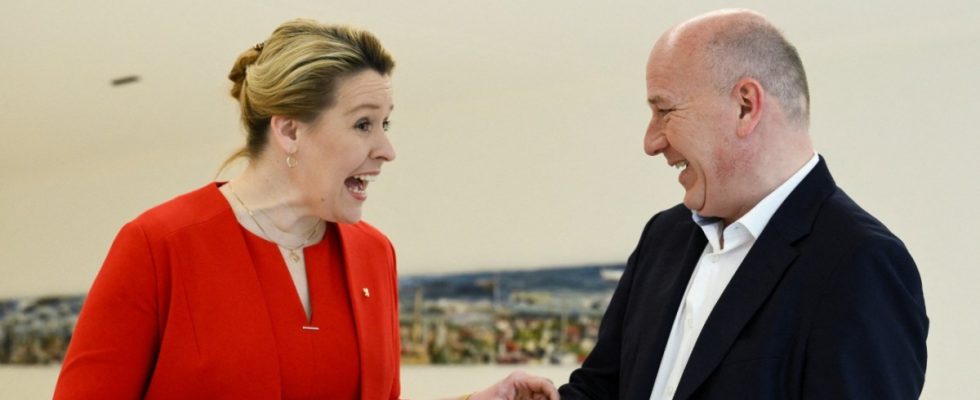For the CDU politician Kai Wegner, the way to the top of the federal capital is clear. The Berlin SPD announced on Sunday evening that in a member survey the majority had approved the coalition agreement between the CDU and SPD. 11,886 of the 18,555 SPD members entitled to vote took part in the vote. 11,379 votes were valid. Of these, 54.3 percent were yes votes.
A CDU party conference still has to approve the coalition agreement this Monday, but a majority there is considered secure. Then Wegner can stand in the House of Representatives for the election of Governing Mayor. The CDU and SPD have 86 of the 159 seats there. The vote is scheduled to take place on April 27th.
The first CDU mayor since Diepgen
Wegner would be the first governing mayor from the ranks of the CDU since Eberhard Diepgen. Diepgen was the head of the capital until 2001. The social democrat Franziska Giffey is currently the governing mayor. After the SPD’s major losses in her party’s re-election, she proposed becoming a junior partner in a grand coalition. Giffey wants to remain part of the government as a senator. The CDU had gained more than ten percentage points in the repeat election and now ranks at 28.2 percent. The SPD only comes to 18.4 percent.
There was considerable resistance in the SPD to the recommendation for a grand coalition – also because the previous red-green-red coalition still has a mathematical majority despite major losses in the House of Representatives. It is even larger than that of a grand coalition. In addition, there are enormous reservations about Wegner and his CDU in parts of the Berlin SPD. For example, the Christian Democrats are accused of their behavior after the New Year’s Eve riots – at the time they asked for the first names of the alleged perpetrators.
Several SPD district associations – including von Giffey – had therefore spoken out against a grand coalition. The Young Socialists criticized the coalition agreement as “a black corset with red ribbons” and called for the existing alliance with the Greens and the Left to be continued. Leading politicians from the Greens and the Left have spoken out in favor of this in the past few days. Another coalition option would have been black-green.
The re-election of the House of Representatives came about because there were significant irregularities in the original election in September 2021. In November 2022, the Berlin Constitutional Court therefore decided that the election must be repeated.
A no by the SPD members to the coalition agreement would probably have led to considerable personnel consequences in the state association. Giffey and SPD parliamentary group leader Raed Saleh – he is also SPD state chairman together with Giffey – had campaigned vehemently for a grand coalition before the member vote. A no by the members of the coalition agreement would have been a declaration of no confidence in Giffey and Saleh.
The two had argued that the coalition agreement with the CDU bears a clear social democratic signature. His priorities would include, for example, greater efforts in housing construction or a billion-euro program for climate protection. In addition, the SPD would be allowed to provide as many senators as the significantly stronger CDU. Nevertheless, only 54 percent of the SPD members have now followed the recommendation of their leaders. That’s a majority – but the result also shows that there are considerable reservations in the Berlin SPD about the course taken by its leaders.

